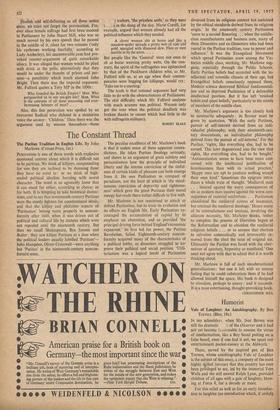Humorist
IN my schooldays:. when Mr. Ivor Brown was still the dramatic 'c of the Observer and it had not yet become ti.snionable to assume the virtue of intellectualism, like a Boy Scout putting on a false beard, even if one had it not, we spent our entertainment pocket-money at the Aldwych.
There, served by the inspired pen of Ben Travers, whose autobiography Vale of Laughter is the subject of this essay, a company of the most highly spilled farceurs that this country has ever been privileged to see, led by the immortal Tom Walls and the still mortal Ralph Lynn, provided children of all ages with a gale of laughter, blow- ing at Force 8, for a decade or more.
For this ,relief as well as for an early introduc- tion to laughter (an introduction which, if unduly, delayed, is sometimes never effected at all) I and millions of my generation owe Mr. Travers much thanks. I have thanked him in person in the past, but I am delighted to be provided with the oppor- tunity of doing so again in print.
Mr. Travers is nothing if not modest. He lays the credit for his success as a farce writer square at the feet of Sir Arthur Pinero, a copy of whose works he secured from a library in the depths of the Malay States. From him, he learnt the art of plot construction and climax and he applied it, with almost unvaryingly successful results, to his tenure of the Aldwych Theatre.
His book is full of amusing little anecdotes, not the least amusing of which is a brief exchange of dialogue with Sir Arthur himself.
'Which is your favourite play, sir?' asked the young Ben Travers.
'The one that made most money,' confidentially replied the master of his craft.
There are also, thrown in for good measure, some intriguing character studies, of which per- haps the most interesting is his portrait of Tom Walls, the be-sidewhiskered ex-policeman who trained his own horse to win the Derby.
Throughout the book Mr. Travers is at pains to tell us that he has always been a shy, modest, self-effacing little man, and after reading his description of the dictatorial methods adopted by his leading-actor-cum-producer, one begins to understand that only a man equipped with such strongly developed negative characteristics could have survived in partnership with such a dicta- torial and self-opinionated character as Mr. Thomas Walls.
'Take the third act away and rewrite the whole bloody thing!' said he, at one rehearsal, and, in- stead of throwing the script in his face, Mr. Travers went away. And possibly his successful 'rewrite' was due to the fact that he had escaped temporarily from the overwhelming ego of Mr. Walls, just as, equally possibly, April the Fifth's success in the Derby may have been due to an unbounded relief that on that particular day he had Fred Lane, and not his owner, on his back.
It is not only of the theatre that Mr. Travers writes. He tells us of his apprenticeship with John Lane of the Bodlcy Head as a sticker-in of press cuttings; he divulges with pardonable pride that he was the first pilot ever to discharge a torpedo
from a shore-based aircraft, and he devotes much space, a little too much for my taste, to his love of cricket. But the book's main value, as with all autobiographies, lies in the light it throws on its author, and this book shows up Mr. Travers in a kindly, mellow, happy and contented glow.
And. full of humour still, notably when he tells of the character in the Lord Chamberlain's office who cried proudly, 'I was the first censor to pass "bottom,"' or when he passed judgement on a family solicitor who failed to draw him up an adequate contract as follows: 'He is dead now and I will not say anything derogatory about him except that I wish he had been dead then.' Such comment makes one wonder if the Aldwych Theatre is finished with him yet.
WILLIAM DOUGLAS HOME



































 Previous page
Previous page